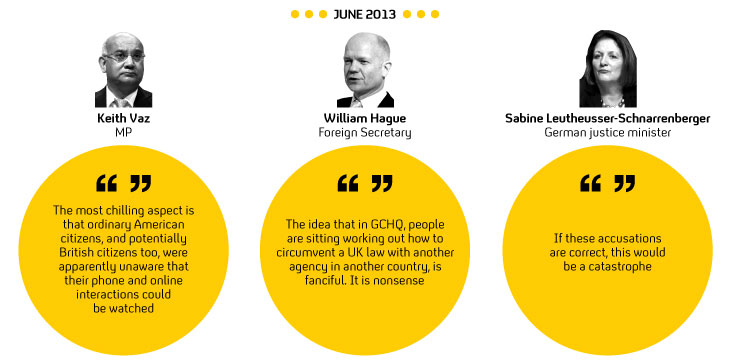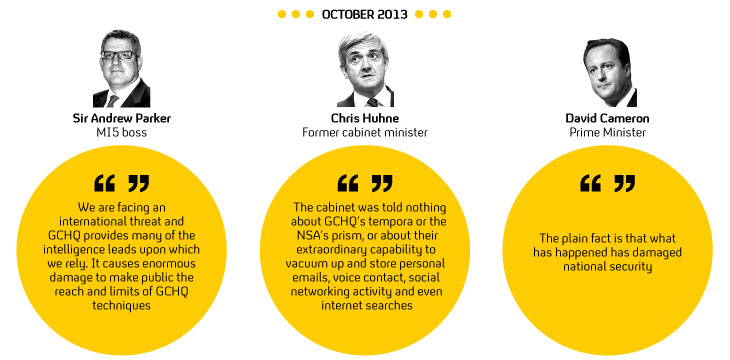What GCHQ knows about us – a timeline of revelations
The NSA is facing reform after outrage from lawmakers in the US. But what about Britains own state-sponsored spying? Channel 4 News revisits the revelations about GCHQ and the reaction.

Across the Atlantic, the waves stirred by revelations about the extent of NSA spying have reached the president’s door. On Friday, Barack Obama will lay out how he plans to reform the US intelligence agency, including changes to the NSA’s mass collection of American’s telephone data and the reining in of its surveillance of foreign leaders.
But documents published by former CIA contract worker Edward Snowden also highlighted the far-reaching surveillance undertaken by Britain’s own intelligence agency, GCHQ.
According to the leaks, GCHQ has been monitoring secret fibre-optic cables that carry the world’s phone calls and internet traffic – and sharing the data with its American counterpart. GCHQ also spied on foreign allies’ phones and computers at the G20 summit in 2009, according to the leaks, and had unlimited access to customers’ phone calls, email messages and Facebook entries stored by British telecoms companies, including BT and Vodafone.
The secretive intelligence agency, whose very existence was not officially acknowledged until 1983, is answerable to Foreign Secretary William Hague, and the intelligence and security committee (ISC) chaired by Sir Malcolm Rifkind.
Read more: How UK and US spied on text messages of Brits
Spooking the spies
However MPs and privacy campaigners have argued that the GCHQ has been subject to little scrutiny in its own country, amid accusations that the committee supposed to be monitoring the agency, is too close to the spies.
The US Congress is in the midst of a debate about the extent of NSA surveillance, with the president preparing to announce reforms, and several US judges have given scathing reports on the NSA’s far-reaching powers, with one saying that NSA spying is “likely unconstitutional” and “Orwellian”.
The idea that in GCHQ people are sitting working out how to circumvent a UK law with another agency in another country is fanciful, it is nonsense – William Hague, June 2013
In Europe, the first parliamentary inquiry into the revelations found that the actions of GCHQ appear to be illegal. British and EU privacy campaigners are also mounting a legal challenge against the secretive British intelligence agency through EU courts, accusing GCHQ of breaching the privacy of millions of British and EU citizens – and breaking article 8 of the EU human rights act.
But in the UK, Mr Hague and the prime minister have so far defended GCHQ, with David Cameron arguing that the Snowden leaks have put national security at risk. And the body that is in charge of overseeing GCHQ, the ISC, found that the agency’s use of Prism – the US system of surveillance – was legal.
However as the flow of revelations continued, this stand has wavered. In October, the ISC announced that it would be investigating the laws surrounding the interception of private communications.
In response to the joint Channel 4 News/Guardian investigation in November, which found that British citizens’ phone, internet and email records were analysed and stored by the American NSA after a change to the code of conduct in 2007, Sir Malcolm also said that GCHQ needed to answer the allegations.
And in December, it further said that the scope would be widened, and that MPs will be receiving evidence until February this year.
Channel 4 News looks back on the last seven months of revelations and reaction:

June 2013 revelations:
– GCHQ accessed and used information the NSA gained from US tech giants like Google & Microsoft through Prism. In the year to May 2012, the agency generated 197 intelligence reports from Prism – a 137 per cent rise from the year before.
– GCHQ spied on foreign allies’ phones and computers at the G20 summit in London in 2009.
– GCHQ has been monitoring secret cables that carry the world’s phone calls and internet traffic – and is sharing it with the NSA – under the Tempora programme.
June 2013 – the response:
– Foreign Secretary William Hague: “The idea that in GCHQ people are sitting working out how to circumvent a UK law with another agency in another country is fanciful, it is nonsense.”
– German justice minister said it would be “catastrophic” if the revelations about UK spying on EU allies are true.
– GCHQ: “Our work is carried out in accordance with a strict legal and policy framework which ensures that our activities are authorised, necessary and proportionate, and that there is rigorous oversight, including from the secretary of state.”

July 2013 – the response:
– The intelligence and security committee clears GCHQ of acting illegally
August 2013 revelations:
– GCHQ received £100m in funding from the US over the last three years, in return for access and influence on the agency.
– British telecoms companies including BT and Vodafone have given GCHQ unlimited access to customers’ phone calls, email messages and Facebook entries
September 2013:
– EU Commission calls for a single EU-wide privacy law to restore trust.
October 2013:
– It is revealed that GCHQ hacked Google and Yahoo! to collect personal data, and shared “entire data flows” with the NSA.
– Privacy campaigners launch legal challenge against GCHQ in the European courts.
– The intelligence and security committee announces an inquiry into interception of private communications laws.

October 2013 – the response:
– Prime Minister David Cameron attacks the “lad-di-da, airy-fairy” critics of GCHQ’s spying.
– MI5 chief Sir Andrew Parker says that surveillance by GCHQ plays a vital role in protecting the UK from terrorism.
– Former Cabinet Minister Chris Huhne writes in the Guardian: “The cabinet was told nothing about GCHQ’s tempora or the NSA’s prism, or about their extraordinary capability to vacuum up and store personal emails, voice contact, social networking activity and even internet searches”.
– Google comments on recent revelations, saying: “We have long been concerned about the possibility of this kind of snooping, which is why we continue to extend encryption across more and more Google services and links.”
November 2013:
– GCHQ allowed the US to store and analyse Britons’ communications, as far back 2004, Channel 4 News reveals.
– In a rare public appearance, the heads of MI5, MI6 and GCHQ say that media coverage of Edward Snowden’s revelations have made life easier for terrorists.
December 2013:
– Data collection by GCHQ poses “primary threat” to EU privacy, says journalist Glen Greenwald.
– A US judge says that NSA spying is “likely unconstitutional” and “Orwellian”.
– The ISC broadens the scope of its public inquiry into the laws governing GCHQ.
-
Latest news
-
Fans react to football clubs increasing season ticket prices4m

-
‘We’re still a long way from justice’, says infected blood scandal victim5m

-
Infected blood scandal: Victims set to receive billions of government compensation7m

-
Iran’s president and foreign minister missing after helicopter crash3m

-
Yungblud launches his own affordable music festival5m

-




